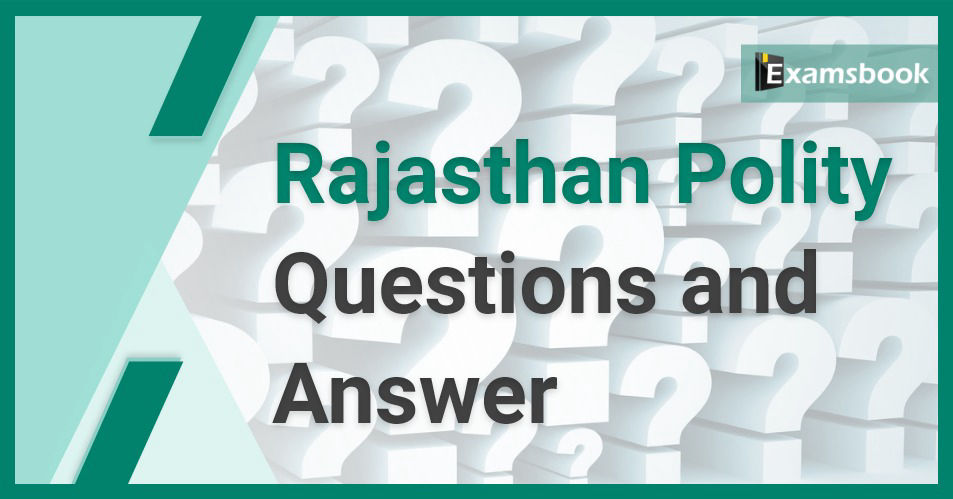Rajasthan Polity Questions and Answers for Practice

What is the minimum age for the post of governor
(A) 35 years
(B) 40 years
(C) 25 years
(D) 45 years
Correct Answer : A
Explanation :
The correct answer is 35 years. 35 years is the minimum age of the person to be a Governor of the State according to the constitution of India. The governor must be a citizen of India. He should not be a member of either house of the parliament or house of the state legislature.
Consider the following statements.
1.There are total 25 members from Rajasthan in 1 Lok Sabha.
2. The total number of members of the Legislative Council in Rajasthan is 200.
3.In Lok Sabha, 4 seats of Scheduled Castes and 3 seats of Scheduled Tribes are reserved from Rajasthan.
(A) 1 and 2 only
(B) 1 and 3 only
(C) 2 and 3 only
(D) 1 only
Correct Answer : B
When was the Panchayati Raj Department established in Rajasthan?
(A) 1950
(B) 1949
(C) 1947
(D) 1951
Correct Answer : B
Explanation :
1. Rajasthan Panchayat Act was enacted in the year 1953. Rajasthan Panchayat Act 1953 was related only to Panchayats, Rajasthan Panchayat Samiti and District Council Act 1959 was related to Panchayat Samitis and District Councils.
2. Bikaner became the first princely state in 1928 when the Gram Panchayat Act was enacted. Rajasthan Panchayat Raj Department was established in 1949.
To whom does the head of the Panchayat Samiti in Rajasthan give his resignation?
(A) District Collector
(B) Auditorium Commissioner
(C) Development Officer
(D) Vice-President
Correct Answer : C
Explanation :
The correct answer is To the development officer. Gram Panchayat is the lowest in the hierarchy of the Panchayati Raj system. Qualification of elected members - Minimum age up to 21 years & educated at least till the 8th standard.
In which Lok Sabha election, the member strength of Rajasthan was increased from 23 to 25?
(A) IV Lok Sabha election
(B) V Lok Sabha election
(C) VI Lok Sabha election
(D) VII Lok Sabha election
Correct Answer : C
Explanation :
Since the first general elections, the number of voters in the state has increased by 4 crore 9 lakhs, while the number of Lok Sabha seats has increased from 18 to 25.
Article 154 states that the Governor can exercise his executive powers directly or through officers subordinate to him. Here who is included in the “subordinate” word.
(A) All ministers and chief ministers
(B) All ministers except the Chief Minister
(C) Chief Minister and Deputy Chief Minister only
(D) only cabinet ministers
Correct Answer : A
Explanation :
The correct answer is Article 154. The executive power of the State shall be vested in the Governor and shall be exercised by him either directly or through officers subordinate to him in accordance with the Constitution of India (Article 154).
Democratic decentralization was suggested by ?
(A) Jayaprakash Narayan
(B) Balwant Rai Mehta
(C) Pandit Naharu
(D) Vinoba Bhave
Correct Answer : B
Explanation :
The Chairman of this committee was Balwantrai G Mehta. The committee submitted its report on 24 November 1957 and recommended the establishment of the scheme of 'democratic decentralisation' which finally came to be known as Panchayati Raj.
In which part of Indian Constitution the union and the states administrative relations are mentioned?
(A) Part - XI, Chapter - II
(B) Part - XIX, Chapter - II
(C) Part - XI, Chapter - III
(D) Part - XI, Chapter - 1
Correct Answer : A
Explanation :
Administrative relations between the Union and the State are described in Part 11 and Chapter 2 of the Indian Constitution.
Which of the following ( Articles - Provisions ) pair is incorrect?
(A) Article 161 Power of Governor to grant pardon
(B) Article 167 - Duties of Chief Minister
(C) Article 213 - Power of Governor to promulgate ordinances
(D) Article 165 Special address by the governor
Correct Answer : D
Explanation :
All the pairs (Article – Provision) are correct.
( A ) Article 161 Power of Governor to grant pardon
( B ) Article 167 - Duties of Chief Minister
( C ) Article 213 - Power of Governor to promulgate ordinances
Which is incorrect statement in the following ?
(A) Chief Minister appoints Parliamentary Secretary and administer oath of office .
(B) Parliamentary Secretaries are appointed to assist Ministers.
(C) State governments have been appointing Parliamentary Secretaries from among MLAs .
(D) The Third Schedule contains the form of oath or affirmation for Parliamentary Secretaries .
Correct Answer : D
Explanation :
All of the following statements are correct.
( A ) The Chief Minister appoints a Parliamentary Secretary and administers the oath of office.
( B ) Parliamentary Secretaries are appointed to assist Ministers.
( C ) State governments have been appointing Parliamentary Secretaries from among MLAs.



